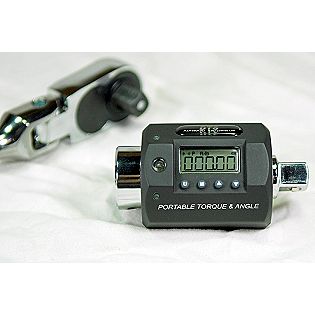
mtn
MegaDork
11/15/12 8:00 a.m.
I bought an old Made in USA torque wrench at a garage sale awhile back for $3.00. Can't recall the brand off the top of my head (I'll check when I get home, not Craftsman or Snap-On), but the thing seemed like it was well built about 40 years ago. Is there any way to check it for accuracy? My thought is to borrow a friends Snap-On and then just start comparing the two on different torqued lugs. I'm guessing that this is the only way to do it?
Put socket, bolt or just the end of the wrench in a vice with the handle out parallel to the ground. Measure 1 or 2 ft from the center of the part stuck in the vice. Put a 10 lb weight (flour, sugar, bar bell, whatever) dangling from a string at the 2' point. That's 20 foot pounds of torque.
Adjust teh maths as needed (different length, weights, etc.)

Torque Meter. Sears stopped selling the Craftsman version, but oddly KMart still sells one:

$300 probably negates the value of finding the wrench at a yard sale, but maybe you can borrow one or some Auto Part shops will let you borrow/rent one? They usually have the $2000+ pro models.
I would think comparing it to a known good torque wrench would be the easiest way. However, if you don't want to go through the hassle of borrowing another wrench, Hess' method is the best one...
How much to just send it in for calibration?
It cost us between $32 and $47 to send torque wrenches for cal. The Hess method is cheaper.
Well, if that $32-$47 results in wrench as good as, if not better than a new $300 unit.
It'd be far cheaper to buy the HF equivalent for $10, and use that as your "calibrator". What type of work do you envision doing with your torque wrench? If you're rebuilding engines, then it might make sense to get it calibrated, but if you're just torquing lug nuts, the other methods will do just fine...

































